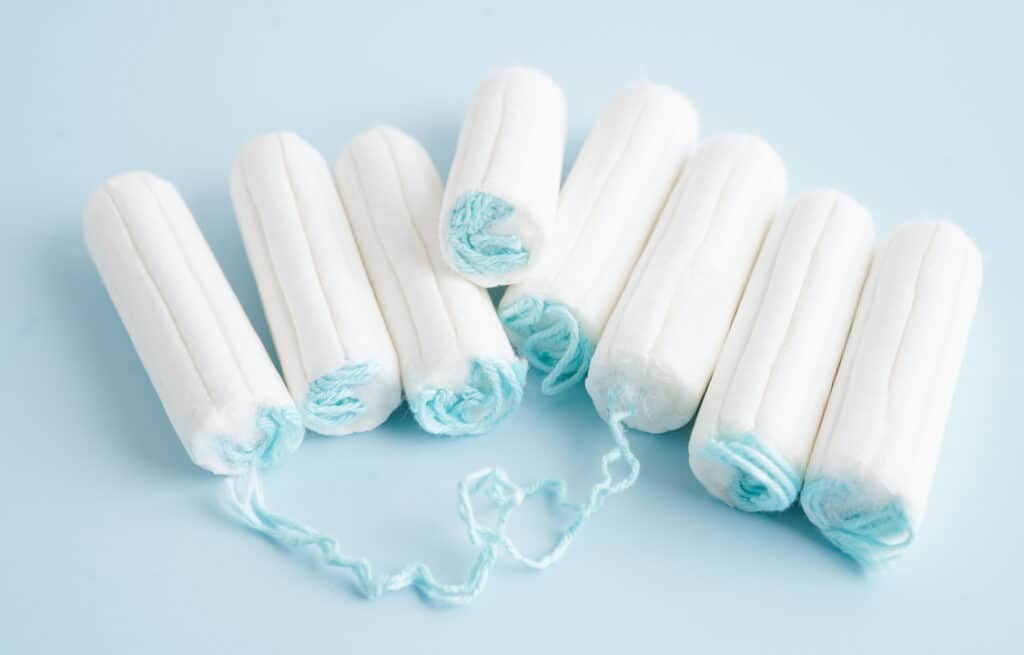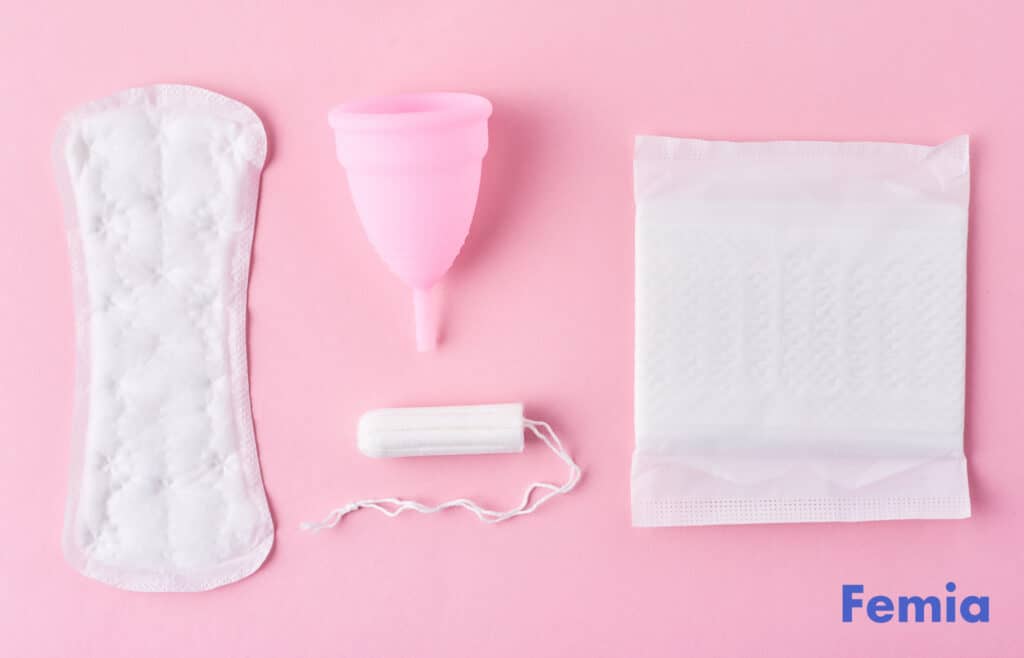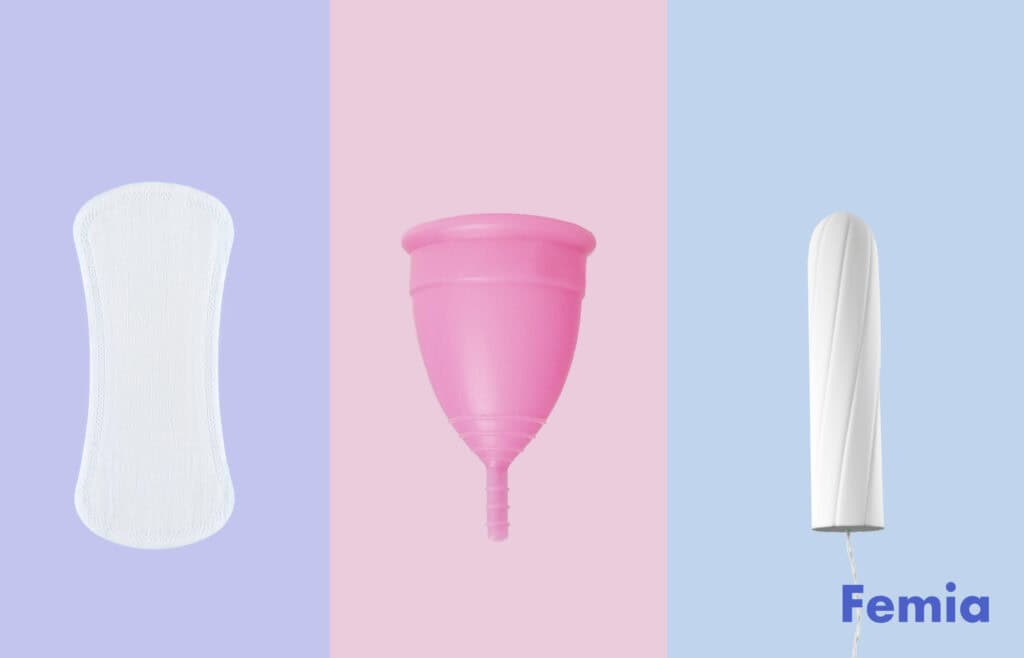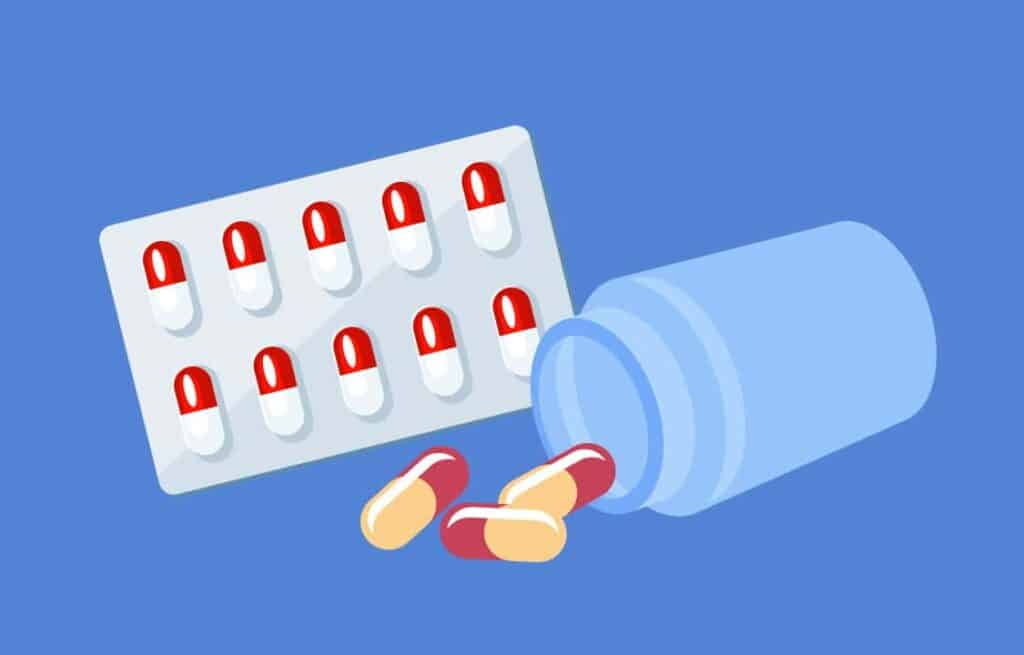Femia > Health Library > Your cycle > Health > Toxic metals found in tampons: What you need to know
Toxic metals found in tampons: What you need to know

- Updated Feb 10, 2025
- Published
CRAFTED BY HUMAN
Crafted by human At Femia, we provide accurate and up-to-date information at every stage of your journey, from trying to conceive, pregnancy and postnatal support. All content is created by a real person based on in-depth research and own professional experience. Femia ensures that you will receive expert advice, strict accuracy and a personalized approach from our authors/medical experts. Learn more about our editorial policy.
FACT CHECKED
Fact checked At Femia Health, we maintain the highest standards of editorial excellence in delivering content focused on helping you conceive, guiding you through pregnancy, and supporting you postpartum. Explore our content review principles to learn how we ensure the accuracy and quality of our health and lifestyle tips for every stage of your journey.
A recent study reports toxic arsenic and lead found in tampons, along with 14 other heavy metals. After testing 30 tampons from 14 brands, researchers detected varying concentrations of toxic compounds in every sample, leading to growing concerns. Due to the hazardous nature of heavy metals and the vagina’s absorbing capability, experts acknowledge the potential cardiovascular, fertility, and other health issues caused by exposure to heavy metals.
Tampons have been generally considered safe for decades and deeply integrated into women’s daily lives. However, a recently published study has raised some new concerns. A group of experts from Columbia University Mailman School of Public Health, University of California Berkeley, Michigan State University, and Lamont-Doherty Earth Observatory of Columbia University performed the first study to measure toxic metals in tampons, causing growing concern over menstrual product safety with their findings.
In this guide, we’ll give you the details of this study and its findings to help you understand the possible implications and answer the primary question: how safe are tampons?
Femia helps you understand your symptoms and when to take action
What was studied?
The purpose of the study was to examine the safety of existing menstrual hygiene brands and eliminate the gap in studies about heavy metals in tampons. For more comprehensive results, researchers selected 14 different brands and randomly purchased 30 tampons between September 2022 and March 2023 in brick-and-mortar stores across three locations: New York, USA; Athens, Greece; and London, England.
The samples were analyzed to measure the concentration of 16 hazardous metals:
- Arsenic
- Barium
- Calcium
- Cadmium
- Cobalt
- Chromium
- Copper
- Iron
- Manganese
- Mercury
- Nickel
- Lead
- Selenium
- Strontium
- Vanadium
- Zinc
What did study find in tampons?
Simply put, researchers found measurable concentration levels of all metals they tested for, including toxic ones like arsenic and lead. According to experts, heavy metals could get into women’s menstrual hygiene products in multiple ways, including accidentally (for example, metals could be absorbed by tampons’ cotton material from soil, air, or water) and purposefully (for example, if manufacturers add certain metals intentionally as a pigment, antibacterial agent, etc.).
Different concentrations of some metals were detected in both organic and non-organic products. Namely, organic tampons were shown to have higher arsenic levels and non-organic ones showed higher lead levels.

Toxic metals in tampons and its impact on woman health
Heavy metals are non-biodegradable, inorganic substances naturally present in the environment. But, despite their presence around us, they are highly toxic and linked to various health risks.
Toxic arsenic and lead found in tampons, as well as other toxic chemicals, is concerning due to the range of known adverse effects these metals can have on our health, including:
- Cardiovascular issues. Experts link exposure to heavy metals to cardiovascular diseases. Studies show that heavy metal toxicity can promote the production of reactive oxygen species, which then induces inflammation. Over time, this can lead to higher risks of arrhythmia, atherosclerosis, and hypertension.
- Immunological issues. Heavy metals like lead and cadmium, which were found in the sampled tampons, are known as immunotoxic contaminants. They can suppress the essential component of your immune system—T lymphocytes—and affect the body’s ability to fight pathogens.
- Reproductive issues. Multiple studies demonstrate the potential effects of exposure to metals on female reproductive health. Toxic compounds can affect all regulations and functions of a woman’s reproductive system and lead to spontaneous abortion, menstrual disorders, endometriosis, endometrial cancer, breast cancer, and infertility.
- Neurological issues. Metal poisoning can result in physical conditions that mimic neurologic diseases, including movement disorders, encephalopathy, seizures, or neuropathy. In the long run, overexposure to these compounds can also provoke such neurological diseases as autism spectrum disorders, amyotrophic lateral sclerosis, Alzheimer’s disease, multiple sclerosis, and more.
- Hematological issues. Human blood cell systems can be affected by heavy metals as well. It can result in variations in red blood cell (RBC) parameters and lead to hematological issues, such as anemia.
- Renal issues. In the case of high exposure levels, heavy metals like arsenic, lead, cadmium, and others can act as toxicants that can impact your kidneys and potentially cause chronic diseases.
- Developmental issues. Some toxic metals are considered potent developmental neurotoxins and linked to congenital and neurological defects. They can lead to behavioral abnormalities, developmental delays, and learning disabilities.
These and other health issues can be triggered by metal exposure. Although these compounds are naturally present in our environment, the concern about the presence of heavy metals in tampons is significantly higher, because a vagina is a mucous membrane, meaning it’s capable of absorbing fluids faster than skin. There is also a lack of liver filtration when it comes to vaginal absorption, which means that all compounds absorbed this way could enter directly into systemic circulation, causing greater health risks.
But don’t get too worried. While this may sound somewhat alarming, the truth is that these complications are generalized and most of the time, the exposure to toxic metals doesn’t cause this degree of illness. The actual effects of exposure on your health are also determined by the amount and mode of exposure, as well as the time of exposure, and we still don’t know if it can happen because of tampon use.
Femia medical expert Dr Kay answer the question about metals in tampons
Dr. Carolyn Kay, an OBGYN physician and Femia expert, emphasizes “While this may sound scary, more information is needed to understand whether we really need to stop using tampons because we just don’t know to what degree these substances are absorbed through the vagina.”
This idea is also confirmed by the study’s authors. As they state themselves, “Although our study found the presence of toxic metals in tampons, future studies are necessary to assess whether metals can leach out of tampons and become bioaccessible for vaginal absorption. Thus, we cannot speculate on potential harm to the health of menstruators.”
We asked Dr. Kay to answer several concerns that might arise in relation to this matter:
— Dr. Kay, what are the potential health impacts of exposure to toxic metals like lead and arsenic through tampon use?
We don’t really know right now because there aren’t enough studies that tell us exactly how much these substances are actually absorbed through the vagina. More research is needed in order to understand how much of these substances are absorbed through the vagina and if they are at sufficient levels that affect our health.
— What would be your recommendations for women who are concerned about the presence of toxic metals in tampons?
– This new information about toxins in tampons is not what most of us would expect from an everyday item like the tampon. It’s important to remind ourselves that we are exposed to many chemicals in small amounts in the course of our normal daily activities, including through our food, clothing, skin products/makeup, hair dyes, soaps, and simply interacting with the world around us. Most of the time, it is either in such negligible amounts or in very superficial ways that it doesn’t have a significant effect on our overall health. So no need to throw out all those tampons…yet.
But this may be a good time to be mindful about the things we consume and use in our lives and make a conscientious decision on whether to continue using something or to find an alternative. And, recognize that even in 2024, there is still a lot of research needed in order to better understand women’s bodies.
What are the regulations?
The US Food and Drug Administration (FDA) is the body governing tampon quality and sales in the United States. Before any hygiene products can be sold, they undergo a thorough FDA review to detect their safety.
Some of the characteristics evaluated by the FDA are:
- Tampon absorbency, strength, and integrity;
- The potential of changing bacterial levels in the vagina or stimulating the growth of harmful bacteria;
- Testing results that demonstrate the safety of materials that tampons and applicators are made of.
Although the FDA controls and governs the quality of menstrual products, tampon brands are still not required to test their products for toxic metals. According to the study’s authors, this is a major omission that needs to be changed. Researchers emphasize the importance of updating tampon safety regulations, given that they found numerous toxic metals present in measurable quantities.
Femia helps you understand your symptoms and when to take action
What to use insted of tampons
Despite certain concerns raised by the exploration of toxic chemicals in tampons, we still need more information to make weighted conclusions. It’s still undiscovered how much of (if any) these compounds can potentially absorb due to the use of tampons.
So generally, it’s okay to continue using tampons, at least until we learn more. But if you are concerned about this and would prefer to take some actions before more data is known, here are a few tips that you can consider to use:
- Consider using organic tampons. These are made of organic materials that can potentially reduce the risks of bacterial and fungal infections and may contain lower amounts of toxic compounds. However, be aware they may contain higher concentrations of arsenic.
- Look for brands with transparent safety testing and ingredient disclosure. As medical devices, tampons have to get through rigorous testing by the FDA to make it to the shelf. Brands that are transparent about their testing results and ingredients might be more trustworthy.
- Consider alternative menstrual products like menstrual cups or organic pads. Dioxins, which are toxic contaminants that can cause cancers and health issues, are known to be present in tampons at levels acceptable to the FDA. These contaminants might also be present in pads, but their effect is considered lower because tampons imply significantly higher absorbency of toxic elements. Period cups, on the contrary, don’t contain dioxins at all. Toxic shock syndrome chances might also be lower if you opt for alternative products.

Questions from the Femia community
Can toxic metals leach out of tampons?
Currently, there is no scientific evidence that heavy metals can leach out of tampons. Further research is required to identify whether toxic contaminants can cross the vaginal epithelium into systemic circulation.
Are organic tampons safer?
Organic tampons may contain lower lead levels but show higher containment of arsenic. Eventually, the safety gets down to each particular product’s quality and the presence/concentration of heavy metals found in it.
What should I look for on tampon labels?
To minimize the potential risks, choose transparent and trustworthy brands. Pay attention to whether they disclose the ingredients in their products and look out for testing results or statements about any toxic metals or other harmful substances.
Should I stop using tampons?
The study that detected toxic metals in tampons raises significant concern about the overall safety of these products. Yet, we don’t have a sufficient scientific evidence base to recommend stopping tampon use. If you are concerned about safety, consider trying alternative menstrual products and keep an eye on further research to learn more about the potential hazards.
The bottom line
If you ever wondered “Do tampons have heavy metals?” Now, we have a clear answer. A recent study found 16 toxic compounds in organic and organic tampons from different brands, purchased in different stores across the EU, US, and UK. The heavy metals contained in tampons include such toxic compounds as arsenic, lead, mercury, and more that are linked to a host of potential health issues.
Naturally, this study has caused growing concern among scientists and consumers as well. However, we still need further research to determine the possibility of heavy metals leaching out of tampons and the scope of health risks that would cause. In the meantime, stay informed about new findings in this field and advocate for better testing and regulation to ensure safer menstrual products.
References
- “U.S. population: Do you use tampons?” Statista, Nov. 2020. https://www.statista.com/statistics/278085/us-households-usage-of-tampons/.
- Jenni A. Shearston, Kristen Upson, Milo Gordon, Vivian Do, Olgica Balac, Khue Nguyen, Beizhan Yan, Marianthi-Anna Kioumourtzoglou, Kathrin Schilling. “Tampons as a source of exposure to metal(loid)s.” Environment International, Volume 190, 2024. https://www.sciencedirect.com/science/article/pii/S0160412024004355.
- Kapahi M, Sachdeva S. “Bioremediation Options for Heavy Metal Pollution.” J Health Pollut, 27, Nov. 2019. https://www.ncbi.nlm.nih.gov/pmc/articles/PMC6905138/#:~:text=Heavy%20metals%20are%20non%2Dbiodegradable,and%20to%20facilitate%20their%20extraction.
- Ziwei Pan, Tingyu Gong, Ping Liang. “Heavy Metal Exposure and Cardiovascular Disease.” AHAIASA Journals, 25, Apr. 2024. https://www.ahajournals.org/doi/10.1161/CIRCRESAHA.123.323617#:~:text=Heavy%20metal%20exposure%20has%20been,cadmium%2C%20chromium)%20and%20CVD.
- Zhang Y. “Toxic effects of heavy metals on the immune system: evidence from population and in vitro studies.” University of Groningen, 2021. https://pure.rug.nl/ws/portalfiles/portal/169979299/Complete_thesis.pdf.
- Lin J, Lin X, Qiu J, You X, Xu J. “Association between heavy metals exposure and infertility among American women aged 20-44 years: A cross-sectional analysis from 2013 to 2018 NHANES data.” Front Public Health, 14, Feb. 2023. https://www.ncbi.nlm.nih.gov/pmc/articles/PMC9971928/#:~:text=Environmental%20and%20occupational%20exposure%20to,cancer%2C%20etc%20(21).
- Chen P, Miah MR, Aschner M. “Metals and Neurodegeneration.” F1000Res, 17, Mar. 2016. https://www.ncbi.nlm.nih.gov/pmc/articles/PMC4798150/.
- Capitão C, Martins R, Santos O, Bicho M, Szigeti T, Katsonouri A, Bocca B, Ruggieri F, Wasowicz W, Tolonen H, Virgolino A. “Exposure to heavy metals and red blood cell parameters in children: A systematic review of observational studies.” Front Pediatr, 6, Oct. 2022. https://www.ncbi.nlm.nih.gov/pmc/articles/PMC9583003/#:~:text=Mechanistic%20studies%20show%20that%20heavy,which%20could%20lead%20to%20anemia.
- Moody EC, Coca SG, Sanders AP. “Toxic Metals and Chronic Kidney Disease: a Systematic Review of Recent Literature.” Curr Environ Health Rep, Dec. 2018. https://www.ncbi.nlm.nih.gov/pmc/articles/PMC6590508/.
- Hsueh YM, Lee CY, Chien SN, Chen WJ, Shiue HS, Huang SR, Lin MI, Mu SC, Hsieh RL. “Association of blood heavy metals with developmental delays and health status in children.” Sci Rep, 2, Mar. 2017. https://www.ncbi.nlm.nih.gov/pmc/articles/PMC5333623/.
- Nicole W. “A question for women’s health: chemicals in feminine hygiene products and personal lubricants.” Environ Health Perspect, Mar. 2014. https://www.ncbi.nlm.nih.gov/pmc/articles/PMC3948026/.
- Elise Proulx. “First study to measure toxic metals in tampons shows arsenic and lead, among other contaminants.” Berkeley Public Health, 3, Jul. 2024. https://publichealth.berkeley.edu/news-media/research-highlights/first-study-to-measure-toxic-metals-in-tampons-shows-arsenic-and-lead.
- “The Facts on Tampons—and How to Use Them Safely.” U.S. Food & Drug Administration, 9, Sep. 2020. https://www.fda.gov/consumers/consumer-updates/facts-tampons-and-how-use-them safely#:~:text=You%20may%20be%20surprised%20to,be%20used%20more%20than%20once.
- Wynne Armand. “How to choose period products.” Harvard Health Publishing, Harvard Medical School, 5, Oct. 2022. https://www.health.harvard.edu/blog/how-to-choose-period-products-202210052828.

Explore 25 weird pregnancy cravings! Find the most common pregnancy cravings food combos. What causes unusual cravings, their meanings, and how to manage them.

Do you weigh more on your period? Discover the causes of weight gain during period, tips to manage the hormonal fluctuations, and how long the weight gain lasts.

What is ureaplasma? Discover the symptoms of Ureaplasma in females, how it is diagnosed, and the treatments. Learn how this infection can impact fertility and well-being.

